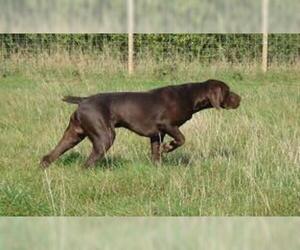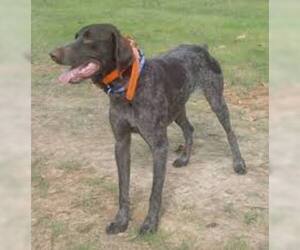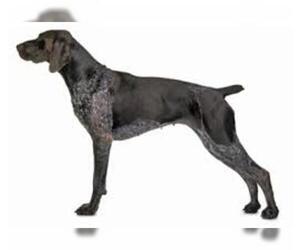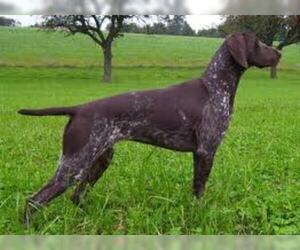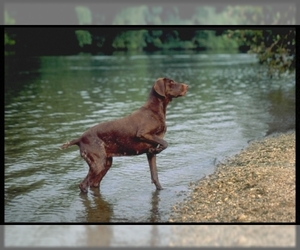
All about German Shorthaired Pointer dog breed
A.K.A. :GSP, Deutsch Kurzhaar, German Pointer, Shorthair, German Bird Dog, Pointing Kurzhaar, GSP Pup, German Gun Dog, Shortcoat Pointer, German Scout, Field Shorthair, GSP Companion, Hunter’s Pointer, Versatile Pointer, German Tracker
Size
Grooming requirements
Exercise requirements
Good with other dogs
Watchdog ability
Energetic
Training requirements
Playful
Affectionate
Good with other pets
Good with children
Good with strangers
Winter
Summer
Healthiness
Protective
Life Span
| Pure Breeds | Member |
| Breeds A - Z | G |
| Breeds by Group | Gun Dog Sporting |
| Breeds by Trait | Fast Dog Breeds Good With Kids High Stamina Dog Breeds Smartest Dog Breeds |
| Overview: | The German Shorthaired Pointer (GSP) is a versatile and elegant sporting breed, originating in 19th-century Germany where it was developed for hunting various game. Physically, GSPs are known for their athletic build, sleek coat (typically liver or liver and white), and intelligent, expressive eyes. They possess a strong, muscular physique that enables them to excel in diverse activities. Temperamentally, GSPs are energetic, intelligent, and highly trainable, making them excellent companions for active individuals or families. Their loyal and affectionate nature means they thrive on human interaction, but their high energy levels necessitate ample daily exercise to prevent boredom or destructive behaviors. While adaptable, their need for space and activity generally makes them less suitable for small apartment living unless their exercise requirements are exceptionally well-met. Regarding health, GSPs are a relatively robust breed, though they can be prone to certain conditions like hip and elbow dysplasia, eye conditions, and certain cancers. Responsible breeding and regular veterinary check-ups are crucial for maintaining their well-being. |
F.A.Q.
All You Need to Know About the German Shorthaired Pointer Breed
The German Shorthaired Pointer (GSP) is a versatile, intelligent dog breed originating from 19th-century Germany, bred for hunting. Known for their striking liver and white or solid liver coats, GSPs are medium-to-large dogs with an athletic build, perfect for an active family. Their temperament is generally friendly, eager to please, and highly trainable, making them excellent companions. However, their high energy levels and strong prey drive mean they require significant daily exercise – think long walks, runs, or engaging dog sports – making them less suitable for apartment living unless their exercise needs are meticulously met. Grooming is minimal, thanks to their short coat, requiring only occasional brushing. They are generally healthy but can be prone to common canine conditions like hip and elbow dysplasia and certain eye conditions. Potential owners should be prepared for a committed, active lifestyle to keep their German Shorthaired Pointer happy and healthy.The average weight of a German Shorthaired Pointer is between 45-70 pounds. Typically, male German Shorthaired Pointers are slightly heavier, ranging from 55-70 pounds, while female German Shorthaired Pointers usually weigh between 45-60 pounds. This is the healthy weight for German Shorthaired Pointer adults, representing their typical average size.
Wondering about the German Shorthaired Pointer height? Here's what you need to know about the average size of these magnificent dogs:
The typical German Shorthaired Pointer height, measured at the shoulder (the highest point of the shoulder blade, excluding the neck and head), ranges from 23 to 25 inches.- Males: Generally, male German Shorthaired Pointers tend to be on the larger side of this range, often measuring between 23 and 25 inches tall.
- Females: Females are usually slightly smaller, typically falling within the 21 to 23-inch range.
The German Shorthaired Pointer colors primarily include a range of brown shades, with the most common being liver. This can appear as solid liver, liver and white (often spotted or patched), or liver roan, which is a fine mixture of liver and white hairs giving a mottled appearance. These are the AKC recognized German Shorthaired Pointer colors. Black is also an accepted color, appearing as solid black, black and white, or black roan. While less common, solid white German Shorthaired Pointers with liver or black patches are also seen and accepted. Rare coat types and exotic German Shorthaired Pointer variations like blue, lilac, merle, chocolate, brindle, fawn, or cream are not officially recognized by the AKC or other major kennel clubs and are considered disqualifications in the show ring. Potential adopters or buyers should be aware that such non-standard colors may indicate mixed breeding or genetic issues and often come with a higher price tag due to their novelty, despite not being breed-standard. Always prioritize health and temperament when choosing a German Shorthaired Pointer, regardless of its color.
The German Shorthaired Pointer possesses a friendly, loyal, and highly sociable personality, making them an excellent family companion. This energetic and intelligent breed thrives on human interaction and aims to please, showcasing a trainable and cooperative temperament of German Shorthaired Pointer. They are generally good with children, especially when raised alongside them, exhibiting a patient and playful nature. However, their high energy means supervision with very young children is always wise. When it comes to other pets, their strong prey drive can sometimes lead to issues with small, non-canine animals, but they typically get along well with other dogs, especially if socialized early. Due to their high energy levels and need for ample exercise, apartment living is not ideal for the German Shorthaired Pointer; they require a home with a yard and an active owner committed to daily physical and mental stimulation. Their adaptability shines through their willingness to participate in various activities, from hiking to field trials. The German Shorthaired Pointer personality is characterized by a devoted and enthusiastic spirit, eager to be a part of all family activities.
The German Shorthaired Pointer temperament is generally described as intelligent, eager to please, and brimming with enthusiasm. They are incredibly friendly and sociable dogs, thriving on human companionship and making wonderful loyal companion dogs. GSPs are highly adaptable, but due to their high energy levels, apartment living is not ideal unless ample daily exercise is guaranteed.They are typically excellent with children, often displaying patience and a playful nature, though their boisterousness as puppies or adolescents might accidentally knock over very small children. Proper early socialization is key to ensuring positive interactions with other pets; they can coexist well with cats and other dogs, especially when raised together, but their strong prey drive can be a factor.While generally biddable, GSPs can exhibit stubbornness if they don't see the point of a command or if they are bored. They are also quite sensitive and respond best to positive reinforcement training methods rather than harsh corrections. Their desire to be involved in family activities means they can become destructive or vocal if left alone for long periods without sufficient mental and physical stimulation. Overall, they are affectionate, energetic, and devoted dogs for an active family.
German Shorthaired Pointer Care: Daily Maintenance & Health TipsGerman Shorthaired Pointer care is generally straightforward, but their high energy demands specific attention. These intelligent, active dogs are not a low-energy dog breed.Grooming Needs: German Shorthaired Pointers have a short, dense coat requiring minimal grooming. Weekly brushing helps remove loose hair and maintain coat health. Bathing is only necessary when truly dirty, using a dog-specific shampoo. Regular nail trims are crucial to prevent discomfort and foot problems.Exercise Requirements: This breed thrives on extensive exercise. They need at least 1-2 hours of vigorous activity daily, such as running, swimming, or active games. Mental stimulation through training and puzzle toys is equally important to prevent boredom and destructive behaviors. This is not a breed for apartment living without significant outdoor access and dedicated exercise.Dietary Considerations: A high-quality, protein-rich dog food formulated for active breeds is essential. Portion control is vital to prevent obesity, a common health concern for German Shorthaired Pointers. Consult your veterinarian for specific dietary recommendations based on age, activity level, and health status.Wrinkle and Ear Cleaning: German Shorthaired Pointers typically don't have wrinkles requiring special cleaning. Their floppy ears, however, can trap moisture and debris, making them prone to infections. Weekly ear checks and cleaning with a veterinarian-approved solution are crucial.Climate Sensitivity: Due to their short coat, German Shorthaired Pointers can be sensitive to extreme cold. Provide a warm, sheltered environment in winter. While they generally tolerate heat well, avoid strenuous exercise during the hottest parts of the day and always provide ample fresh water. They are NOT a brachycephalic breed, so the specific concerns related to brachycephalic anatomy do not apply to GSPs.Common Health Concerns & Prevention: How to care for a German Shorthaired Pointer includes being aware of common health issues. They are generally a healthy breed, but can be prone to hip and elbow dysplasia, eye conditions (like progressive retinal atrophy), certain cancers, and skin allergies. Regular veterinary check-ups are paramount for early detection and prevention. Dental care is also crucial; daily brushing or dental chews can help prevent periodontal disease. Weight management through proper diet and exercise is key to preventing many health problems and extending their lifespan.
German Shorthaired Pointer Activity Level: High Energy, Active Lifestyle Required
How active are German Shorthaired Pointers? The German Shorthaired Pointer activity level is distinctly high. These are athletic, energetic dogs bred for hunting, requiring significant daily exercise to stay happy and healthy. They are not suitable for low-energy households or apartment living without dedicated efforts to meet their needs.Typical Energy Levels: German Shorthaired Pointers possess a remarkable balance of explosive energy and a surprising ability to relax once their needs are met. They can engage in short bursts of intense activity, like sprinting after a ball or in the field, followed by long periods of rest and snuggling indoors. However, these "long periods of rest" only occur *after* they've had ample physical and mental stimulation.Daily Exercise Needs: Expect to provide at least 60-90 minutes of vigorous exercise daily, often more. This isn't just a leisurely walk; it needs to be mentally and physically engaging. Think:* Long, brisk runs or jogs* Extended games of fetch in a secure area* Hiking* Swimming* Agility training* Field work or scent gamesTheir intelligence also demands mental stimulation to prevent boredom and destructive behaviors. Puzzle toys, training sessions, and interactive games are crucial.Playtime Preferences: German Shorthaired Pointers love interactive playtime with their families. They excel at retrieving, running, and exploring. They are highly intelligent and enjoy activities that challenge both their bodies and minds.Brachycephalic Anatomy Limitations: This is a crucial point: German Shorthaired Pointers are NOT a brachycephalic breed. They have a distinct, well-defined muzzle, which allows for efficient breathing and panting. This means they are generally much more tolerant of exercise in warmer weather compared to true brachycephalic breeds (like Pugs or Bulldogs), though all dogs are susceptible to overheating in extreme conditions. Their excellent respiratory system is a key factor in their high endurance.Suitability for Families: German Shorthaired Pointers are ideal for active families who enjoy outdoor activities and are committed to consistent training and exercise. They thrive with owners who can integrate them into their active lifestyles, offering them plenty of opportunities to run, play, and explore. They are wonderful companions for runners, hikers, and anyone looking for a loyal, energetic partner.German Shorthaired Pointer Health: What You Should Know
Potential German Shorthaired Pointer owners often ask about common German Shorthaired Pointer medical issues. This active breed is generally robust, but there are specific German Shorthaired Pointer health problems to be aware of for optimal long-term care.While German Shorthaired Pointers are not brachycephalic, so Brachycephalic Obstructive Airway Syndrome (BOAS) is not a concern, their athleticism can predispose them to hip dysplasia and elbow dysplasia. These joint conditions can impact their mobility and require careful management. Regular veterinary check-ups and a healthy weight are crucial for preventing and managing these issues.Allergies are also fairly common in German Shorthaired Pointers, manifesting as skin irritation, ear infections, or digestive upset. Identifying and avoiding triggers, along with veterinary-prescribed treatments, can help keep German Shorthaired Pointers healthy. Due to their short coat, they can be susceptible to skin issues like environmental allergies, which may require specific shampoos or dietary changes.Their deep chest, while ideal for running, can increase the risk of bloat (gastric dilatation-volvulus), a life-threatening condition. Feeding smaller, more frequent meals and avoiding vigorous exercise immediately after eating can help mitigate this risk.While not typically associated with widespread spinal problems, like some other breeds, any active dog can experience injuries. Proper training and avoiding excessive jumping can reduce strain.Lastly, due to their active nature and short coat, heat sensitivity is a concern. Always provide access to shade and water, and avoid strenuous exercise during hot weather to prevent overheating. Understanding these common German Shorthaired Pointer medical issues and providing proactive care is key to a happy, healthy life for your GSP.Breed Breakdown: What Experts Say About the German Shorthaired Pointer
I'd rate the "Size" trait of the German Shorthaired Pointer (GSP) a 7 on a scale from 1 to 10.GSPs are definitely not small dogs, but they aren't giant breeds either. They fall squarely into the medium-to-large category. Typically, males stand around 23-25 inches at the shoulder and weigh 55-70 pounds, while females are slightly smaller. Their athletic, muscular build gives them a substantial presence without being cumbersome. Compared to very small companion dogs like Chihuahuas (1) or even medium-sized dogs like Beagles (4), they are significantly larger. However, they are notably smaller than giant breeds such as Great Danes (10) or Mastiffs (9). This makes them a good fit for homes with a decent amount of space, and while not ideal for tiny apartments, they can adapt to apartment living if they receive ample daily exercise and have a dedicated space indoors. Travel can be managed, but they'll require more space than a smaller dog, likely needing the back seat of a car or a larger crate. Households with severe space constraints would likely find a GSP to be a bit too much dog.
I would rate the German Shorthaired Pointer's "Grooming Requirements" as a 3.German Shorthaired Pointers are a relatively low-maintenance breed in terms of grooming. Their short, dense coat sheds moderately year-round, with slightly heavier shedding seasonally, but it doesn't require complex brushing or professional grooming. A weekly brush with a rubber curry comb or a bristle brush is usually sufficient to remove loose hair and keep the coat healthy. They don't have skin folds that require special care, and while their ears should be checked weekly for cleanliness and signs of infection due to their floppy nature, this is standard for most dogs with similar ear types. Nail trimming should be done regularly, as with all dogs, and they only require bathing when they get particularly dirty, which isn't often. They aren't particularly prone to skin issues or allergies compared to many other breeds, making their overall care quite straightforward and easy for the average owner. They definitely do not require frequent, specialized grooming compared to breeds with long, thick, or curly coats.
I would rate the German Shorthaired Pointer's "Exercise Requirements" at a 9.This breed possesses incredibly high energy levels and was bred for demanding, sustained work in the field. A GSP isn't just content with a daily walk; they thrive on vigorous, structured exercise that taps into their natural hunting instincts and impressive stamina. Their lean, athletic build and deep chest allow for excellent respiratory capacity, making them well-suited for long runs, intense games of fetch, hiking, and agility training. Without at least 1-2 hours of intense physical activity daily, coupled with mental stimulation, a GSP is highly likely to become bored, destructive, and potentially develop behavioral issues. They truly require consistent, challenging routines to stay healthy, happy, and mentally balanced. Minimal activity simply doesn't cut it for this energetic athlete; they need to work and run.
I'd rate the German Shorthaired Pointer's "Watchdog Ability" at a 7 out of 10.GSPs are highly intelligent and observant dogs, making them excellent at noticing changes in their environment. They are generally quite alert to new sounds and people, and their protective instincts are certainly present, especially towards their family. They will typically bark to announce the arrival of strangers or unusual activity, providing a meaningful early warning. This isn't a breed that will silently watch an intruder; their vocalizations are usually quite enthusiastic. While they possess a deterrent bark and a confident presence, they aren't typically "attack dogs" in the same vein as some guarding breeds. Their protective nature leans more towards warning and alerting their owners rather than aggressive confrontation. They are definitely more capable of providing meaningful early warnings in a home environment than being a passive companion, though their friendliness means they might readily accept a stranger if their owner doesn't signal caution.
I would rate the German Shorthaired Pointer's "Good with Other Dogs" trait a 7 out of 10.German Shorthaired Pointers generally possess a friendly and outgoing temperament, which often extends to other dogs. They are typically playful and energetic, traits that can make them excellent companions for other active canines. With proper socialization from a young age, most GSPs readily adapt to living in multi-dog households and enjoy the company of their peers. They can often do well with dogs of various sizes and energy levels, particularly if those dogs can keep up with their zest for life.However, the "7" rather than a higher score acknowledges a few nuances. Their strong prey drive, inherent to the breed's hunting purpose, can sometimes manifest as an overly enthusiastic chase of smaller, faster dogs, even in play. While rarely aggressive, this intense focus can be overwhelming for some dogs and requires supervision. Furthermore, without adequate socialization or sufficient exercise, a GSP's boundless energy can sometimes be misinterpreted as rude or dominant by more reserved dogs. They thrive in canine company and generally require careful introductions, especially with more sensitive or much older dogs, to ensure peaceful coexistence. Their high energy and sometimes boisterous play style need to be managed to avoid unintentional roughhousing, and early training is crucial to teach appropriate canine etiquette. While they generally want to be friends, their sheer exuberance sometimes needs guidance.
I'd rate the German Shorthaired Pointer's "Energetic" trait a solid 9 out of 10.This breed is the epitome of high energy. GSPs are naturally incredibly active, possessing an almost boundless enthusiasm for life and movement. Their endurance is exceptional, allowing them to participate in strenuous activities for extended periods without tiring. Playfulness is a core part of their personality; they thrive on interaction and games that involve running, fetching, and exploring. They have an extremely high need for physical stimulation, and without it, they can become bored, destructive, or develop behavioral issues. Their athleticism makes them ideal partners for virtually any outdoor or athletic activity, from long-distance running and hiking to agility, dock diving, and, of course, their intended purpose as hunting dogs. Compared to most other companion dog breeds, GSPs are far from laid-back; they are go-getters who require significant daily exercise to be happy and well-adjusted. Fortunately, their dolichocephalic (long-nosed) anatomy means they do not suffer from the respiratory issues that can affect brachycephalic breeds, allowing them to breathe efficiently and maintain their high stamina and exercise tolerance without hindrance.
I would rate the German Shorthaired Pointer's "Training Requirements" a 7 out of 10.While highly intelligent and eager to please their human companions, GSPs are not a breed for the faint of heart or the entirely inexperienced. Their intense energy, strong prey drive, and can-do attitude require a dedicated and consistent training regimen. They have a good attention span for tasks they find engaging, especially those involving their natural hunting instincts, but can become easily bored or distracted if training isn't varied and stimulating. They respond exceptionally well to positive reinforcement and praise, making treats and enthusiastic encouragement very effective. However, their intelligence can also manifest as a degree of stubbornness, particularly if they perceive an opportunity to follow their nose or if commands aren't consistently enforced. They thrive on structure and routine, and a lack of clear boundaries will quickly be exploited. Therefore, GSPs are generally not recommended for first-time dog owners unless they are prepared to invest significant time and effort into structured training and socialization. Experienced handling, a firm but fair approach, and a commitment to ongoing mental and physical stimulation are crucial for channeling their boundless energy and intelligence into a well-behaved and happy companion.
The German Shorthaired Pointer scores a robust 9/10 on the "Playful" trait. This breed is not just naturally spirited; they are a whirlwind of joyful energy and a true enthusiast of life. Their typical activity level is exceptionally high, and they thrive on constant motion and engagement. GSPs absolutely adore games, whether it's a vigorous session of fetch, a stimulating puzzle toy, or a boisterous game of chase with their human or canine companions. They are highly interactive and will actively seek out attention and play, often nudging with their nose or bringing a toy to initiate fun. Their response to toys and playtime is overwhelmingly enthusiastic; they'll often leap and bound with excitement at the sight of a beloved squeaky or a ball. In daily life, their overall enthusiasm is palpable, marked by a perpetually wagging tail, a curious gaze, and a readiness to embark on any adventure, making them far more energetic and fun-loving than many other companion breeds.
I'd rate the "Affectionate" trait of the German Shorthaired Pointer a strong 9 out of 10.German Shorthaired Pointers are incredibly loving and people-oriented dogs that absolutely thrive on human companionship. They have a deep desire to be an integral part of their family's lives, often displaying a strong "velcro dog" tendency to follow their owners from room to room. Physical closeness is very important to them; expect them to lean into you, demand pets, and often attempt to be a lap dog despite their size. Their loyalty is unwavering, and they are remarkably sensitive to their owner's emotions, often offering comfort when they sense distress. While they possess an independent drive in their work ethic, when it comes to family, they are profoundly attached and much prefer to be by your side rather than alone. They truly crave and return affection in spades, making them wonderfully demonstrative companions.
I would rate the German Shorthaired Pointer's "Good with Other Pets" trait as a 7 out of 10.German Shorthaired Pointers are generally quite sociable and can get along very well with other dogs, often thriving in multi-dog households where they can have playmates. They are energetic and enjoy interactive play, and their friendly nature extends to other canines. However, their strong prey drive is a significant factor, particularly concerning smaller, fast-moving animals like cats. While many GSPs can learn to coexist peacefully with cats, especially if introduced as puppies and raised together, it often requires early, consistent socialization and ongoing supervision. Their instinct to chase can be powerful, and without proper training and management, a cat might be seen as prey rather than a housemate. Resource guarding, while not inherently dominant in the breed, can manifest if not addressed through training, especially with food or prized toys. Their high energy and need for mental stimulation also mean they can become boisterous and overwhelming for more timid pets if not adequately exercised. Therefore, while naturally friendly and adaptable, successful integration into a multi-pet household, especially one with cats or small animals, largely depends on diligent training, early socialization, and consistent supervision to manage their inherent instincts and high energy levels.
I would rate the German Shorthaired Pointer's "Good with Children" trait a 7 out of 10.German Shorthaired Pointers are generally loving, playful, and energetic dogs that can be wonderful companions for active families with children. Their high energy levels mean they enjoy playing and running, which aligns well with older, more robust children who can match their enthusiasm. They are often patient and tolerant, especially if properly socialized from a young age. However, their boundless energy and sometimes boisterous nature can be a bit much for very young or timid children, as they might accidentally knock them over during play. While they are naturally affectionate, their strong prey drive and need for consistent training mean that supervision is crucial, especially when younger children are interacting with them, to ensure respectful handling from both sides. They thrive in a family setting where they receive plenty of exercise and mental stimulation, which helps channel their energy constructively.
The German Shorthaired Pointer scores a robust 8 on the "Good with Strangers" scale. This breed is naturally quite sociable and friendly, typically greeting unfamiliar adults with an enthusiastic, if sometimes boisterous, wag of the tail. They possess an outgoing personality and a generally curious nature, which contributes to their welcoming demeanor. While not inherently reserved, they do exhibit a degree of awareness and will often offer a brief assessment before fully engaging. They are not typically prone to excessive barking or guarding behavior with strangers, especially when well-socialized. Their adaptability in public or guest-filled environments is high; they generally enjoy being part of the action and thrive on interaction. While their natural inclination is toward friendliness, early socialization and positive experiences with a variety of people are still crucial to ensure they develop into well-adjusted and consistently welcoming companions. Without proper socialization, any dog, even an inherently friendly one, can become more wary, but the GSP's baseline is strongly inclined towards being good with strangers.
I would rate the German Shorthaired Pointer's winter tolerance at a 4.While GSPs are active and generally robust dogs, their coat is relatively short and thin, lacking the dense undercoat or insulating qualities found in breeds bred for extreme cold. They are lean with a moderate amount of body fat, but this isn't enough to provide significant protection against sustained low temperatures. Their athletic build and size mean they can generate some body heat through activity, but this is quickly lost in very cold or damp conditions. They do not have brachycephalic anatomy, which is a positive, as it reduces respiratory difficulties in cold air. However, they are still quite susceptible to hypothermia, especially during periods of inactivity or if exposed to wet and cold conditions for too long.Compared to other companion dogs, GSPs definitely require special care during winter months. They are not naturally equipped for harsh winter weather and will need coats or sweaters for outdoor activities in cold climates, particularly during prolonged walks or when temperatures drop significantly below freezing. Owners should be mindful of the risk of frostbite on their ears and paws, and limit time spent outdoors in extreme cold. While they enjoy outdoor activity, it's crucial to ensure they are adequately protected and not pushed beyond their thermal limits.
I would rate the German Shorthaired Pointer's "Summer" tolerance at a 7.While not brachycephalic and possessing a short coat, GSPs are high-energy dogs bred for active work. Their ability to regulate body temperature is generally good, but their drive to run and play can override their natural inclination to rest in the heat. This puts them at a moderate risk of heatstroke, especially during vigorous exercise in warm or humid conditions. While they don't require the extreme climate control of a bulldog, they do need special care in summer months compared to many other companion dogs. Owners must be vigilant about scheduling outdoor activities for early morning or late evening, providing ample shade and fresh water, and avoiding strenuous exercise during peak heat. Unlike a more sedentary dog that might naturally choose to nap indoors, a GSP will often push itself too hard, necessitating owner intervention and careful management to prevent overheating.
I would rate the German Shorthaired Pointer's "Healthiness" trait as an 8.This breed is generally considered robust and enjoys a relatively long life expectancy, typically 12-14 years. They are known for their athleticism and stamina, which usually translates to good overall physical condition. While not entirely free from genetic predispositions, their common health issues are largely manageable with responsible breeding and preventive care, and they aren't plagued by the severe breathing difficulties or widespread structural problems seen in some other breeds.Specifically, GSPs can be prone to hip and elbow dysplasia, certain eye conditions like progressive retinal atrophy, and some heart conditions like aortic stenosis. However, these issues are often screened for by reputable breeders, and early detection and management can significantly improve the dog's quality of life. They are not typically considered high-maintenance in terms of health, but like any active breed, they require consistent exercise, a high-quality diet, and routine veterinary check-ups to maintain their excellent health. Compared to many companion breeds, they are generally robust and resilient.
I would rate the "Protective" trait of the German Shorthaired Pointer (GSP) as a 6 out of 10.GSPs are highly intelligent, alert, and loyal dogs that form strong bonds with their families. Their inherent alertness, combined with a strong prey drive and a desire to please their owners, means they are typically quick to notice and react to unusual sounds or sights around their territory. They will often bark to alert their owners to the presence of strangers or perceived threats, making them excellent *watchdogs*. This early warning system is a significant aspect of their protective nature.However, GSPs are generally not aggressive by nature and their primary instinct when encountering a stranger, once properly introduced and if no immediate threat is perceived, is more often curiosity or friendliness rather than outright aggression. While they are loyal to their owners, their territorial instincts are usually expressed through vocalization rather than physical confrontation. They are robust and active dogs, and their size and assertive barking can certainly be a deterrent, but they are generally not considered suitable as dedicated *guard dogs* whose role is to physically prevent entry or attack. They are fundamentally companion dogs bred for hunting, and their protective instincts are more geared towards alerting and standing by their family rather than actively engaging in a defensive fight. Therefore, while they offer meaningful vocal protection and deterrence, they are not typically relied upon for the intense, physical protection associated with true guard breeds.
I would rate the German Shorthaired Pointer's "Life Span" trait a 7.This rating places them in the average to slightly above-average range for companion dogs. German Shorthaired Pointers typically live between 10 to 14 years, with a good number reaching the higher end of that spectrum. While they are susceptible to some common health issues like hip and elbow dysplasia, certain eye conditions, and heart problems, responsible breeding practices and diligent care significantly mitigate these risks. They are not considered exceptionally long-lived like some toy breeds, but their robust health and active lifestyle generally contribute to a respectable lifespan, making them neither short-lived nor remarkably long-lived compared to the broader canine population.
German Shorthaired Pointer Puppies for saleSee all puppies for sale
German Shorthaired Pointer Dogs for adoptionSee all dogs for adoption
German Shorthaired Pointer BreedersSee all breeders
Similar Dog Breeds for German Shorthaired Pointer
Breed Mixes of German Shorthaired Pointer
Quick Breed Selector 0 - not important, 1 - smallest, 10 - largest
Variants & Mistakes :German Shorthair Pointer, German Shorthaired Poiter, German Short Haired Pointer, German Shorthaired Pointers, Germann Shorthaired Pointer, German Short-haired Pointer, German Shorthaired Pinter, German Shorthaired Pointed, German Shorthaired Poirter, German Shorthair Pointers, German Shorthaired Point, German Short Hair Pointer, German Shorthaired Pointre, Germen Shorthaired Pointer, German Shorthaired Poiner, Geman Shorthaired Pointer, German Shorthaired Pointerr, German Shorthaired Pointerd, German Shorthaired Pintor, German Shorthaired Poainter, German Shorthaired Poinnter, German Shorthaired Poter, German Shorthaired Porinter, German Shorthaired Poynter, German Shorthaired Pointier, German Shorthaired Pointeer, German Shorthaired Poiinter, German Shorthaired Potiner, German Shorthaired Poitr, German Shorthaired Pointar, German Shorthaired Pointere, German Shorthaired Poirnt, German Shorthaired Poirnte, German Shorthaired Pointera, German Shorthaired Pointerz, German Shorthaired Pointerx, German Shorthaired Pointerc, German Shorthaired Pointerv, German Shorthaired Pointerb, German Shorthaired Pointery, German Shorthaired Pointeru, German Shorthaired Pointeri
